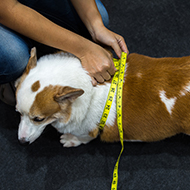Research exposes extent of dog obesity crisis

The study found that 7.1 per cent of dogs under veterinary care were recorded as overweight in a single year.
A new study has revealed the extent of the dog obesity epidemic in the UK, highlighting which breeds are more prone to weight gain than others.
The research, led by the RVC’s VetCompass programme, found that 1 in 14 dogs are recorded by their vets as overweight each year. The authors suggest this figure may just be the tip of the iceberg because not every overweight pet will receive veterinary attention for the problem.
Among the breeds found to be especially prone to weight gain were pugs, golden retrievers, beagles and English springer spaniels. Researchers stress that owners of these breeds should be especially vigilant to protect their dogs from piling on pounds.
Dr Dan O’Neill, a senior lecturer in companion animal epidemiology at the RVC, and co-author of the paper said: “To defeat your enemy, you need to know your enemy. Obesity is the enemy of the health of our dogs. This new study identifies the breeds and ages of dogs that are most susceptible to obesity; we can use this information to defeat obesity.”
The study - one of the largest ever to use anonymised health records of veterinary surgeries to explore the obesity issue of dogs - followed the health of 22,333 dogs over a year, of which 1,580 were recorded as being overweight.
As well as revealing that certain dog breeds are more prone to weight gain than others, the study found that being neutered and middle-aged were also associated with being overweight. Other key findings include:
- 7.1 per cent of dogs under veterinary care were recorded as overweight in a single year
- eight breeds showed an increased risk of overweight status compared with crossbred dogs:
pug (x 3.12)
beagle (x 2.67)
golden retriever (x 2.58)
English springer spaniel (x 1.98)
Border terrier (x 1.72)
Labrador retriever (x 1.70)
cavalier King Charles spaniel (x 1.50)
cocker spaniel (x 1.32). - two breeds showed a reduced risk of overweight status compared with crossbred dogs:
Shih-Tzu (x 0.53)
German shepherd dog (x 0.55) - Dogs aged 6 to < 9 (years) had the highest risk of overweight status (x 2.99) compared with dogs < 3
- neutered males had the highest risk (x 1.90) compared with entire females
- insured dogs had 1.28 times the risk of overweight status compared with uninsured dogs.
Dr Eleanor Raffan, an associate lecturer in systems physiology, at the University of Cambridge, and co-author of the paper, said: “Where breed increases risk of a problem, it means genes are likely to be at least in part to blame and our previous work suggests that genetics drives a high appetite in some breeds. The bad news is that owners of food-obsessed dogs have to work much harder to keep their dogs at a healthy weight – the good news is that it can be done.”



 The Veterinary Medicines Directorate (VMD) is inviting applications from veterinary students to attend a one-week extramural studies (EMS) placement in July 2026.
The Veterinary Medicines Directorate (VMD) is inviting applications from veterinary students to attend a one-week extramural studies (EMS) placement in July 2026.